- Home
- Andrew Wareham
Dire Shenanigans (The Making of a Man Series, Book 2) Page 12
Dire Shenanigans (The Making of a Man Series, Book 2) Read online
Page 12
“Thus, Mr Carnegie, I propose to make my way to the East Coast and there set up the shipyards I have been considering. If I am to be present there, then in the nature of things, I cannot be here…”
“True indeed, ma’am! You are considering selling your majority holding in Clausens, I would imagine? Have you contacted any buyers yet?”
“I am not even entirely certain I wish to sell, sir. I had wondered rather whether I might not hire the services of one of your managers.”
Carnegie wondered whether he was being manipulated – that sweetly smiling face hid a shockingly acute brain. Possibly. Probably, in fact, but no matter – he had far rather she was at a distance from Pittsburgh and his business.
“A million flat, ma’am, in cash, for your shares in Clausens and in Carnegies.”
“That is roughly two hundred and fifteen thousand English pounds, Mr Carnegie, to be deposited in Parsons and Burke’s account in Liverpool, England. A yard in England and an ironclad gunboat – sea-going, of course – shown to the Lords of the Admiralty there. Screw propellers rather than paddlewheels and carrying a pair of ten inch guns such as my man has in mind – a very useful addition to Queen Victoria’s navy, and the first of hundreds needed to replace the wooden ships. The American navy will not match the Royal Navy for many, many years, and one should go where the trade is to be found. Additionally, sir, if I am not to produce my own steel in America, then I would rather not be a purchaser competing for the limited output yet available. I will quite probably set up my own steel plant on a coalfield in England, thus to have no concern about my sources of supply. I should imagine that if I sell Clausens to you there would be a legally enforceable agreement that I would not commence steel production elsewhere in the States?”
He nodded thoughtfully – he did not want her competition – she was too astute, and she was fishing for an increase in his offer.
A slight additional expenditure and she would go away, leaving the steel industry of Pittsburgh effectively in his hands. If she stayed then she would inevitably expand – no problem in wartime with its unending government demand, but the war must end soon, surely. McClellan with his endless failures had finally been dismissed and the Union was looking to new generals and new campaigns, and there must be a victory in the East before too many months passed. It would be wise to remove his competitors before peace was declared, and Miss Parsons was the most obvious danger to him in Pittsburgh. He could not have a woman killed – the suspicion alone would cause outrage - and it would not be easy to drive her into insolvency; he must pay her price.
“Two hundred and twenty thousand, ma’am, in English pounds, and you will be gone by the end of the week?”
She spat on her hand. “Done, sir!”
He clasped her hand, grimacing very slightly – he did not really like such close contact with any person’s bodily fluids.
She agreed to clear her office within the day and returned to the works and sought out Mr Bleaker, her own bright young engineer who had such interesting ideas about cannon and armour plate and sea-going ironclads. Mr Bleaker was an unconventional man in certain of his ways, she had discovered, though she believed he was ignorant of her knowledge of his habits; it might help to persuade him.
“I am selling out to Mr Carnegie, Mr Bleaker, and shall move all of my endeavours to England, possibly to the town of Liverpool, though it may transpire that another place is better, closer to steelworks we could use. I shall leave only the Washington offices open, necessary to run the importing business and to oversee my lands in Missouri and Kansas.”
Bleaker was dismayed to hear this – he knew that although he was senior man in Clausens since the poor founder’s fall from grace, and from life, he would be only one, and insignificant at that, among Carnegie’s many employees.
“I would wish you to remain in my employ, Mr Bleaker, bringing your vast talents to my new firms.”
“In England, ma’am? I am not sure that I wish to leave the States.”
“Despite all you may have heard, Mr Bleaker, the climate is very pleasant there, and the general run of folk are much more tolerant that they are here. Your friend Jonathan, who I believe shares your house, could be less of a recluse than he must be in Pittsburgh.”
He was deeply shaken, could not imagine how she had heard of the dear boy’s existence – they had been so discreet.
“I do not know, Miss Parsons, what unfortunate… innuendoes, shall we say, have come to your ears, but I assure you, ma’am…”
“You need assure me of nothing, Mr Bleaker, for I have no interest in your personal… affairs, shall we say? I would suggest, however, that there are others far less open-minded than myself who might be inclined to denounce you from their pulpits. You will not find that in England, Major Burke assures me. Even a small amount of money is adequate to ensure one’s privacy there, sir. Needless to say, as my chief engineer, we will not be talking about small sums. Your earnings, sir, will be substantial.”
“Perhaps I should talk the matter over with Jonathan, Miss Parsons.”
“Of course you should, Mr Bleaker. There is no urgency, at all, though you might wish to give me an answer tomorrow?”
Washington first, then north to New York and a British ship across the Atlantic; she might, with any luck, be in Liverpool inside six weeks.
She rummaged through the papers in her filing cabinets, leaving those relating to the everyday running of the firm, removing all that referred to inventions, possible patents and new theories. Very few engineering drawings remained by the time she had filled her leather trunk.
Her final endeavour of the day was to visit her bank and arrange with the manager for all those sums that might be regarded as her share of Clausens’ profits to be transferred to Parsons and Burke in Liverpool. She was carefully honest, ensuring that the firm’s working capital was left intact, that every man’s wages was safe and outstanding bills could be paid. She had little doubt that her bank account was not secret from Mr Carnegie – he was far too powerful in the town – and that she would be taken up if she laid her hands on monies that were not strictly and definitely hers.
Mr Bleaker confirmed that he would accompany her to England, was pleased to remain in her employ; she thanked him and handed over one thousand in gold and instructed him to fully equip himself and meet her at the Washington station in New York for midday just three weeks later. Tickets to Liverpool would be her concern – three of them, she said.
“Mr Larson, a pleasure to see you again, sir! I am, finally, to cross the great ocean, sir, and wish you to become my manager in the United States, with full charge of the business of Parsons and Burke. Additionally, and separately, I would wish you to accept responsibility for the management of the Parsons family’s landholdings in the States of Missouri and Kansas. This may not be an easy task, for the two states are uneasy in hands of the Union at the moment, but eventually all will be made well. The holdings are all of farming land, Mr Larson, and should remain as much as possible in wheat production, for sale to England mostly. Find tenants as becomes necessary and use your own discretion on such matters as share-cropping and the use of free blacks. It is more important to keep the land in good heart than to make a profit in the next years, sir, and you may wish to assist the farmers with the building of barns and such. Eventually, it is possible that the family may return to live there – but not until peace has been restored to our riven land.”
He made his thanks for the increase in responsibilities and in his pay.
“Our endeavours in the South become increasingly hazardous, ma’am, and more expensive as a result. I am inclined to withdraw from that business and concentrate on the luxury trade with Europe almost exclusively.”
She could accept that - the Mississippi was now almost entirely in Union hands and smuggling must be far more dangerous an activity.
“You are the manager, Mr Larson – I am not to appoint you and then to veto your decisions! It occurs to me that Major
Burke made mention of the trade in patent medicines, which is big in England and in which he is increasingly interested. Is there a place for such in the States, do you think?”
There was indeed; many thousands of severely wounded men had been discharged from the armies and were suffering at home, often with very little care available because so many doctors had gone to the war. There would be a ready market for medicines that might ease their pains.
“I will despatch such quantities as may be available at earliest, Mr Larson.”
Just three days in Washington, enough to confirm her distaste for the frenetic wartime city, and she took the cars to New York where she busied herself with the details of a cross-Atlantic passage for herself and Mr Bleaker and his friend.
There were still Confederate commerce raiders at large and passage in an American ship was not without hazard. She sought out the offices of the British and North American Royal Mail Steam Packet Company, commonly known by its founder’s name as Cunard, and the largest of the British ‘lines’ that now dominated the Atlantic passenger trade.
“RMS Scotia, ma’am, is to make her first eastward crossing in two weeks. A nine day passage, ma’am, first class only – some five hundred and seventy of passengers at a ticket price of one hundred and fifty dollars for the most luxurious accommodation on the ocean, ma’am. RMS Scotia is one of the largest ships in the world, ma’am, a two-masted paddle-steamer of three thousand, eight hundred and seventy-one registered tons!”
She bought a ticket for herself on the Scotia, and two second class tickets on a lesser vessel for Mr Bleaker and his 'young brother', who would share a double cabin, but not in her view.
First Class would demand appropriate attire – she had time to visit the best of New York’s dress shops and outfit herself fully. Gold could work wonders, she discovered, even with a dressmaker’s needle.
She boarded and admired the great ship – a huge dining room to seat one half of the passengers at a time; two vast saloons, glass panelled so that one might look out at the sea; cabins with nine feet high ceilings. There was a great mob of stewards, all ready to serve and to meet one’s every wish.
Although every passenger was first class, tickets varied in cost and in the service offered. She had paid very nearly the highest price and found herself on the second sitting of dinner, the most prestigious because there was no pressure of time. First sitting had to be in and out in an hour and a half, but second could linger through the evening, sipping at a glass of wine or hammering the brandy bottle, depending on individual preference.
As a single woman travelling without escort, Miss Parsons attracted attention. When it was discovered that she was a dollar millionairess in her own right, the ex-proprietor of Clausens, so recently added to the famous Mr Carnegie’s portfolio, interest became notoriety. The information that she was travelling to England to the home of the equally famous Major Burke, her fiancé, compensated with a degree of respectability that a mere businesswoman could not claim.
The ship's master in person, the Commodore of the Cunard Line, sought her out on the first evening at sea, pompous in his full set of whiskers and gold-braided uniform and conscious of the honour he did her by making her the recipient of his words.
“You may not have heard, ma’am, the award was only gazetted on sailing day, that Major Burke is now a holder of the Congressional Medal of Honor in recognition of his repeated acts of gallantry in the field?”
“I am very proud to discover that, sir. Equally, it is with some trepidation that I must ask just what he has done now! His heroism at Bull Run is a matter of record, of course, but I assume he has added to his laurels.”
The Master under God of the Scotia ponderously told her of General Grant’s letter of commendation and of her man’s acts. He offered his own approval, thinking it at least as significant as that of General Grant.
“He is to return to England on duty later this year, I understand. I think I would be well-advised to track him down and drag him into church while I still may!”
A pair of single gentlemen who had crossed the Atlantic to view the war and possibly strike up an acquaintance with one of the rich American heiresses one read of so often, exchanged glances and positioned themselves to leap to her side. The casualties in the war were so high that a hero fiancé was as near a dead man as made no difference; the poor girl would, sooner or later, require a source of comfort.
The weather was kind to them and the Scotia made her advertised time, paddles thrashing mightily and burning coal at eight tons an hour, riding much higher in the water as her bunkers emptied. She was not a profitable proposition as a cargo carrier; Miss Parsons made a quick calculation of the average weight of passengers to give her a figure for freightage rates of nearly two thousand dollars a ton. There were no goods in either country that could pay that price to cross the Atlantic.
She spoke idly to the First Mate on the topic. He, like the other officers, was obliged to socialise with the passengers in some of his off-duty hours and was not used to being asked sensible questions by the younger female passengers.
“Coals, ma’am? Vastly expensive on paddle steamers – the system is wasteful of power, so much going to turn the weight of the wheels themselves. Far better to use the screw propeller, and I believe in fact that this is the last of the great paddle steamers. I am told that the line is to use screw propulsion only in future. I hope to command one such in a few years, ma’am.”
He smiled winningly – the ‘Masters under God’ of steamships enjoyed some degree of prestige in their own right.
Miss Parsons had little interest in mere seamen, was content to return a very brief expression of hope that he would secure his ambition.
She turned the conversation to his home port of Liverpool and its industries.
"Cotton, ma'am, in terms of bulk. Almost every bale of cotton imported from the States was used to enter England through Liverpool. The smaller Scottish textile industry uses the Port of Glasgow. Not many mills in Liverpool - mainly warehousing, ma'am. Other than that, the refining of sugar is very big - large quantities of molasses come into Liverpool as well as rough brown sugar. Tropical fruits as well. Growing all the time is the grain trade, ma'am, supplying massive flour mills along the River Mersey. Less and less of England's bread is grown in its own fields. Some amount of beef in tins comes through as well, but in the nature of things, not too much - it is an expensive meat."
"You do not mention shipbuilding and iron and steel, sir."
"Iron and steel are more important over on the East Coast, ma'am, and shipbuilding is contracting in Liverpool as a result, though there are the big yards on the Birkenhead side of the river. Newcastle and Sunderland have far more of those heavy industries - coalfields together with iron mines, ma'am."
She smiled and thanked him and forgot about him as she turned away to find an Atlas of England so that she might discover the location of the East Coast. She was amazed to place it as no more than a hundred or so miles distant, almost next door in American terms. She had thought it to be far away, said as much to Lord Alfred Renshawe when he inevitably appeared at her side at the luncheon buffet. She had taken his measure in the first day of the voyage - pleasant, more than averagely intelligent, poor; he was a second son, living probably on a thousand a year and with no expectations and with no concept of working for his living.
"Distances are different in England, ma'am. So many people in so small an island means that ten miles is as far away as New York from Washington in most people's minds. The ordinary man takes a train for two hours to the 'seaside' once a year and thinks it an adventure. The East Coast contains different people and a separate way of life, or so I understand - it is not the sort of place I would go to, of course."
"I suspect I shall, my lord." She had rapidly picked up the correct habit of address, though sneering internally whenever she used it. "If I am to create a steel works and a shipyard then it seems that the East Coast is the place to be."
/> "But, why ever would you wish to do that, ma'am?"
He was amazed, dumbfounded - she seemed such a pleasant, decent sort of a girl.
"To make money, of course, my lord! What other possible reason could there be?"
He had no answer. Money was not the sort of thing one 'made' - it was to be inherited, or married into, and then never mentioned. He could not imagine 'making' money - that would smack of work, and that was not an occupation for a gentleman. For a gentlewoman it was even less of a possibility.
"You propose to actually take charge of a business yourself, ma'am?"
"Of course - I own my half share of Parsons and Burke and have run the American side since my poor brother died. Now I propose to create a new firm in England. You will have seen reference to ironclads, sir, and to Mr Ericsson's wonderful Monitor; well, my engineer has ideas that go beyond that, both in armour and in guns, and we shall build and sell them in England."
Lord Alfred was silenced - literally, he could think of nothing to say. Her proposal was so far out of his experience that he could not encompass it. Added to that, warships were surely exclusively a male preserve - armour plate and great guns indeed! Had she talked of manufacturing the new sewing machines, well that would have been strange but not outside of the realms of the possible for a young female, but naval ships, killing and all that - no!
"Of course, much will depend on Major Burke. If he appears in England in the immediate future then he may have other ideas and may be able to persuade me to them."
"Persuade, ma'am? One might expect one's husband to command, surely!"
"My money is mine, sir. His will be his - and he is shareholder in a very successful business in Liverpool, I am told. I shall be very happy to wed Major Burke, as goes without saying, I trust! But I am his match in business, I believe, and will not retire to kitchen and cradle, sir!"

 A Killing Too Far
A Killing Too Far Killing's Reward
Killing's Reward A New Place
A New Place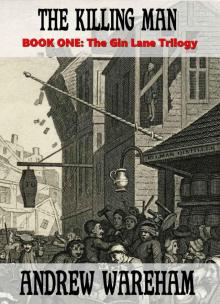 The Killing Man
The Killing Man Bold and Blooded
Bold and Blooded The Breaking Storm (Innocent No More Series, Book 2)
The Breaking Storm (Innocent No More Series, Book 2) Nobody’s Child
Nobody’s Child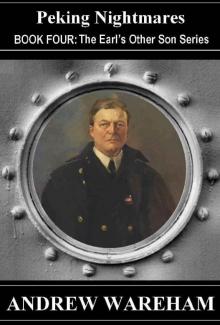 04 Peking Nightmares (The Earl’s Other Son Series, #4)
04 Peking Nightmares (The Earl’s Other Son Series, #4)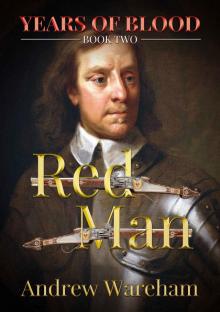 Red Man
Red Man Foreign Mud
Foreign Mud The Gathering Clouds (Innocent No More Series, Book 1)
The Gathering Clouds (Innocent No More Series, Book 1) 06 A Soldier’s Farewell (Man of Conflict #6)
06 A Soldier’s Farewell (Man of Conflict #6)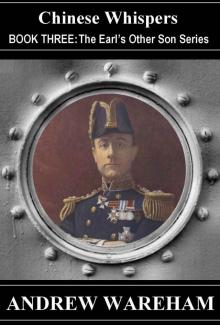 Chinese Whispers
Chinese Whispers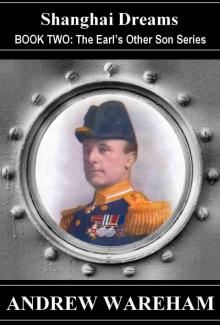 02 Shanghai Dreams (The Earl’s Other Son #2)
02 Shanghai Dreams (The Earl’s Other Son #2) Hungry Harry: An Orphan in the Ranks
Hungry Harry: An Orphan in the Ranks A Wretched Victory (Innocents At War Series, Book 6)
A Wretched Victory (Innocents At War Series, Book 6) Illusions Of Change (A Poor Man at the Gate Series Book 6)
Illusions Of Change (A Poor Man at the Gate Series Book 6)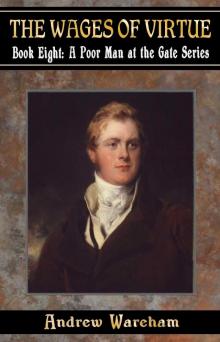 The Wages Of Virtue (A Poor Man at the Gate Series, Book 8)
The Wages Of Virtue (A Poor Man at the Gate Series, Book 8) Blood and Famine (Man of Conflict Series, Book 4)
Blood and Famine (Man of Conflict Series, Book 4) The Friendly Sea (The Duty and Destiny Series, Book 1)
The Friendly Sea (The Duty and Destiny Series, Book 1) Bursting Balloons (Innocents At War Series, Book 5)
Bursting Balloons (Innocents At War Series, Book 5)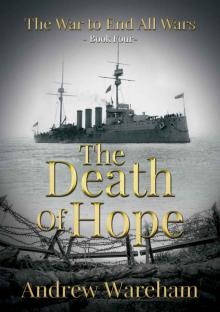 The Death of Hope
The Death of Hope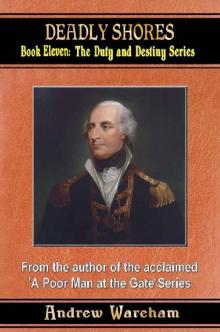 Deadly Shores (The Duty and Destiny Series, Book 11)
Deadly Shores (The Duty and Destiny Series, Book 11)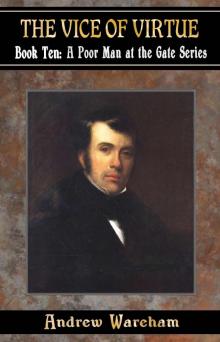 The Vice Of Virtue (A Poor Man At The Gate Series Book 10)
The Vice Of Virtue (A Poor Man At The Gate Series Book 10) Virtue’s Reward (A Poor Man at the Gate Series, Book 11)
Virtue’s Reward (A Poor Man at the Gate Series, Book 11) A Deadly Caper (Innocents At War Series, Book 2)
A Deadly Caper (Innocents At War Series, Book 2)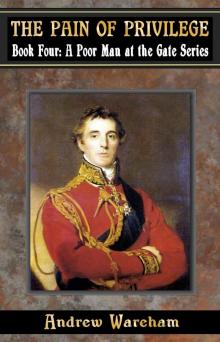 The Pain Of Privilege (A Poor Man at the Gate Series Book 4)
The Pain Of Privilege (A Poor Man at the Gate Series Book 4)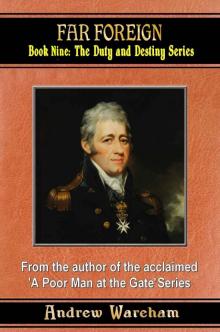 Far Foreign (The Duty and Destiny Series, Book 9)
Far Foreign (The Duty and Destiny Series, Book 9)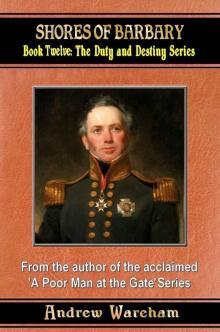 Shores of Barbary (The Duty and Destiny Series, Book 12)
Shores of Barbary (The Duty and Destiny Series, Book 12)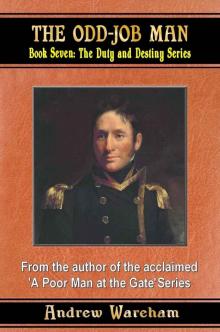 The Odd-Job Man (The Duty and Destiny Series, Book 7)
The Odd-Job Man (The Duty and Destiny Series, Book 7) Fire and Folly (Man of Conflict Series Book 3)
Fire and Folly (Man of Conflict Series Book 3)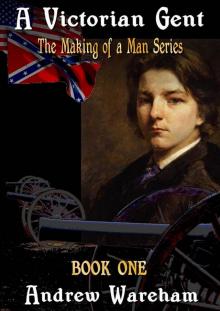 A Victorian Gent (The Making of a Man Series, Book 1)
A Victorian Gent (The Making of a Man Series, Book 1)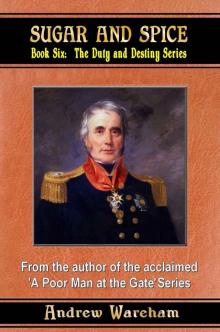 Sugar and Spice (The Duty and Destiny Series, Book 6)
Sugar and Spice (The Duty and Destiny Series, Book 6) Dark Days Of Summer (Innocents At War Series, Book 4)
Dark Days Of Summer (Innocents At War Series, Book 4)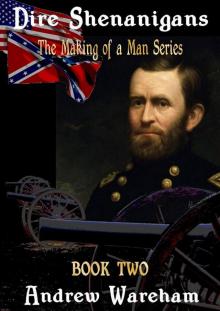 Dire Shenanigans (The Making of a Man Series, Book 2)
Dire Shenanigans (The Making of a Man Series, Book 2)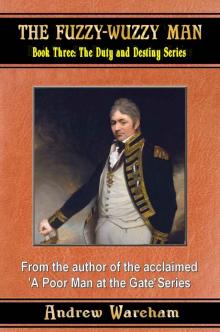 The Fuzzy-Wuzzy Man (The Duty and Destiny Series, Book 3)
The Fuzzy-Wuzzy Man (The Duty and Destiny Series, Book 3) Privilege Preserved (A Poor Man at the Gate Series Book 5)
Privilege Preserved (A Poor Man at the Gate Series Book 5) No Longer A Game (Innocents At War Series, Book 3)
No Longer A Game (Innocents At War Series, Book 3)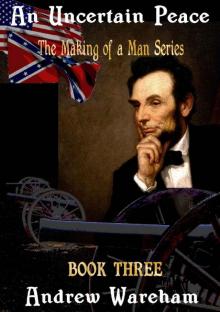 An Uncertain Peace (The Making of a Man Series, Book 3)
An Uncertain Peace (The Making of a Man Series, Book 3)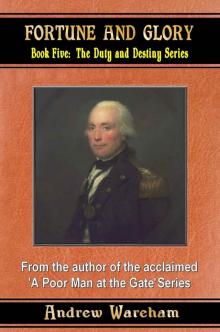 Fortune And Glory (The Duty and Destiny Series, Book 5)
Fortune And Glory (The Duty and Destiny Series, Book 5) The Old Order (A Poor Man at the Gate Series Book 7)
The Old Order (A Poor Man at the Gate Series Book 7) A Place Called Home (Cannibal Country Trilogy, Book 2)
A Place Called Home (Cannibal Country Trilogy, Book 2) Nouveau Riche (A Poor Man at the Gate Series, Book 2)
Nouveau Riche (A Poor Man at the Gate Series, Book 2) The Privateersman (A Poor Man at the Gate Series Book 1)
The Privateersman (A Poor Man at the Gate Series Book 1) Britannia’s Son (The Duty and Destiny Series, Book 4)
Britannia’s Son (The Duty and Destiny Series, Book 4) Long Way Place (Cannibal Country Trilogy, Book 1)
Long Way Place (Cannibal Country Trilogy, Book 1) Spanish Tricks (Man of Conflict Series, Book 5)
Spanish Tricks (Man of Conflict Series, Book 5) A Parade Of Virtue (A Poor Man At The Gate Series Book 9)
A Parade Of Virtue (A Poor Man At The Gate Series Book 9)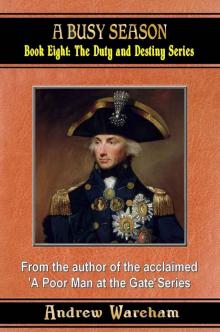 A Busy Season (The Duty and Destiny Series, Book 8)
A Busy Season (The Duty and Destiny Series, Book 8) Billy Bacon and the Soldier Slaves (Colonial Warrior Series, Book 1)
Billy Bacon and the Soldier Slaves (Colonial Warrior Series, Book 1) Raging Rajahs (Man of Conflict Series, Book 2)
Raging Rajahs (Man of Conflict Series, Book 2)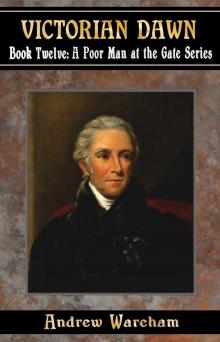 Victorian Dawn (A Poor Man at the Gate Series, Book 12)
Victorian Dawn (A Poor Man at the Gate Series, Book 12) Born To Privilege (A Poor Man at the Gate Series Book 3)
Born To Privilege (A Poor Man at the Gate Series Book 3) The Soldier Brat (Man of Conflict Series, Book 1)
The Soldier Brat (Man of Conflict Series, Book 1)